It’s book review day, and today’s featured books all have a faith component, while also addressing very different topics—I just love that even a sub-genre like Christian Nonfiction can encapsulate such an array of subject matter. I learned so much from each of these books and am excited to share them with you today.
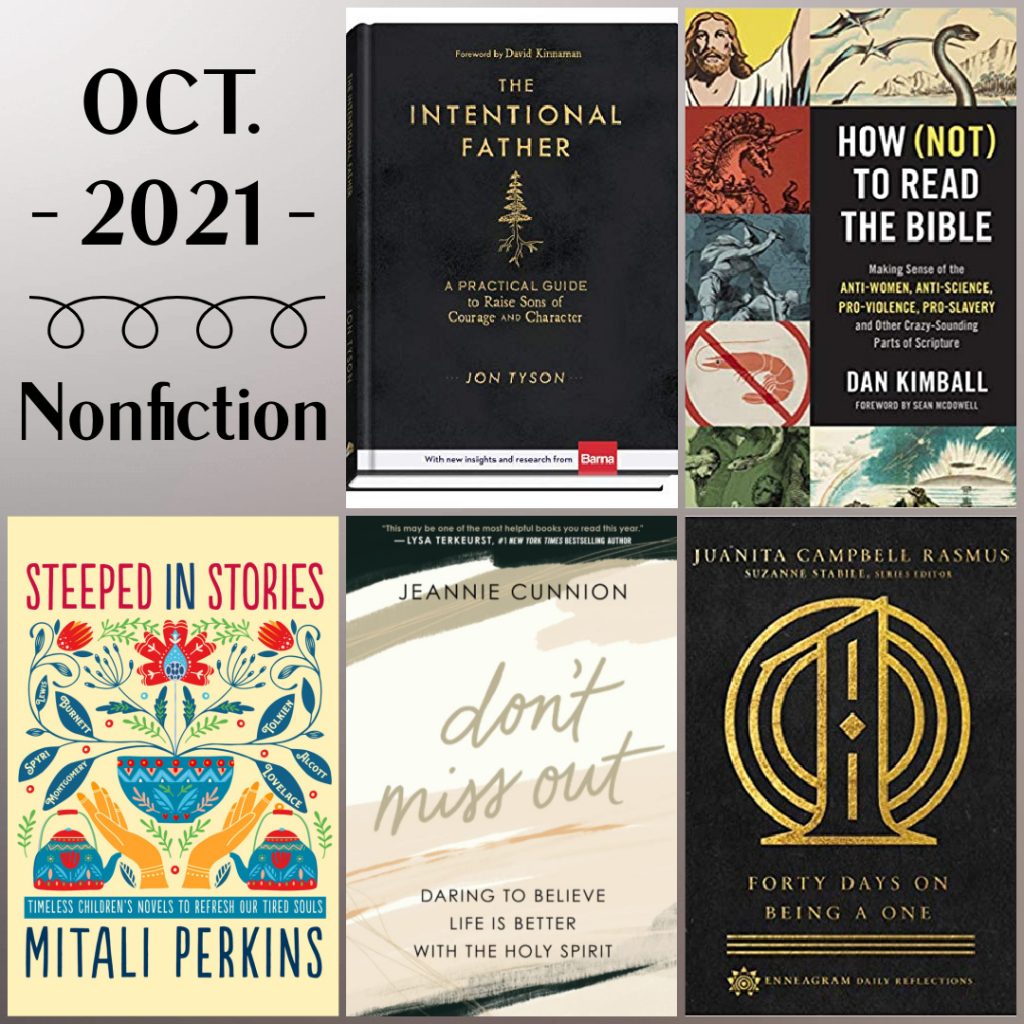
Don’t Miss Out: Daring to Believe Life Is Better with the Holy Spirit, by Jeannie Cunnion: The Holy Spirit is often the forgotten person of the trinity: modern Christians spend little time talking about or focusing on the Holy Spirit, yet He is referenced throughout Scripture, and Jesus Himself told His followers that His (Jesus’s) leaving them was to their benefit because they would receive the Spirit—in other words, the gift of the Holy Spirit in our lives is better than living alongside the person of Jesus!
Jeannie Cannon was a lifelong follower of Jesus, but in recent years she began to realize that she was not accessing the full potential of the Christian life because she had been neglecting the presence of the Holy Spirit within her. In this book she shares all she has learned about the Holy Spirit—from His attributes to His purpose to the work that He can do in the lives of believers. I have never read (or even heard about) a book dedicated entirely to the Holy Spirit, but I spend a lot of time thinking and talking about the Holy Spirit (Charleston in particular has a lot of questions about the Holy Spirit which has prompted quite a bit of study on my part in order to respond to his questions) . . . so I couldn’t wait to read this book.
While parts of this book were review, I learned SO MUCH. Jeannie answered some of my lingering questions about what the Spirit does and does not do, and she helped me to see how I can begin living in full alignment with the Spirit who is living in me, equipping me to live out my calling and purpose. The book’s subject matter may be a challenging one, but the narration is easy to follow and understand, and I loved the reflection questions at the end of each chapter.
The title had me slightly concerned that this would veer into prosperity Gospel or self-help territory, but that couldn’t be further from the truth. The book doesn’t make any promises not backed by Scripture, and the focus is on holiness and sanctification that the Spirit does IN US and not on anything we may do ourselves. What an encouraging, inspirational, and well-researched book that would be perfect for studying with a small group.
My Rating: 4 Stars.
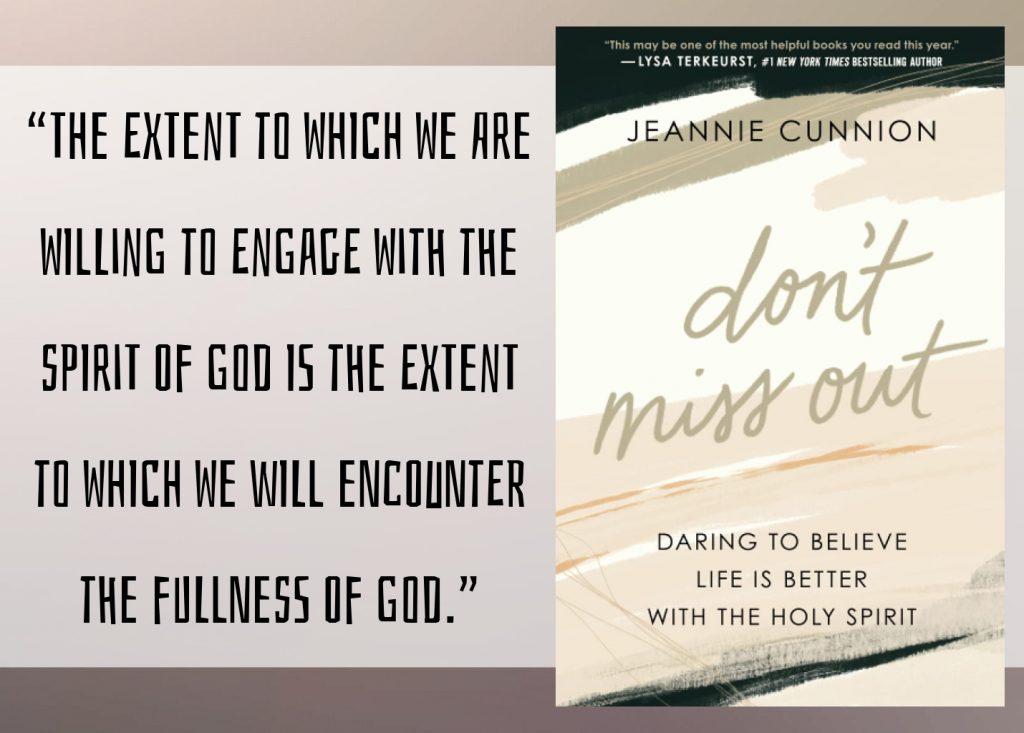
How (Not) to Read the Bible: Making Sense of the Anti-women, Anti-science, Pro-violence, Pro-slavery and Other Crazy-Sounding Parts of Scripture, by Dan Kimball: I have a couple of friends who are brand new to Christianity and are reading through the Bible, Genesis through Revelation, for the first time. These friends are open to learning but have had several questions—understandably! Without the right tools and context, the Bible can seem confusing, contradictory, and potentially antithetical to what Christians claim we believe. Pastor and author Dan Kimball understands how the Bible can be a hangup for some interested in Christianity; in fact, he has encountered former Christians who claim that it was reading the Bible that led them to reject Christ and embrace atheism. Kimball’s passion for helping people make sense of the more challenging aspects of Scripture led to this book.
How (Not) to Read the Bible is a useful guide for those new to the Bible as well as those of us who have studied it for years and still have questions. Kimball introduces several crucial principles for interacting with Scripture, such as understanding the original audience and the cultural and historical context for the various books; never reading (and especially not applying) verses in isolation; and understanding how the various parts of the Bible form a cohesive narrative that points to Jesus.
Following this introduction to HOW to read the Bible, Kimball digs into some of the more complicated passages that are frequently misapplied or misunderstood, showing the fallacies in cultural objections based on assumptions that the Bible is anti-science, anti-woman, pro-slavery, or pro-violence. Kimball acknowledges how misreading of Scripture could lead to these false assumptions, then shows how the Bible does NOT send the messages many have mistakenly gleaned from its pages. For some of the most challenging issues (such as Old Testament passages describing God’s destruction of people groups and condoning of violence), Kimball is honest about where even he still struggles to reconcile apparently contradictory parts of God’s character, admitting that some of his answers might not be satisfactory but that this has not led him to turn away from God or His Word.
Quite a few of the points made in this book were familiar to me, but many were new. I was particularly intrigued by the various interpretations of the Creation story (I had no idea there were so many!) and the explanations of how Christians can navigate the tensions between what we know from science and what it seems the Bible is telling us about the natural world. I also loved the chapters on the pro-feminist messages in the Bible, which is a personal favorite subject of mine. I found Kimball’s explanations informative and especially helpful for me as I seek to help my friends make sense of the Bible for the first time.
I wasn’t a fan of the book’s complicated structure or repetitiveness, and at times the tone was a little off-putting (an odd blend of humor and factualness with some defensiveness mixed in), but overall this was a useful and well-researched book that has the potential to help many people who need help accessing God’s Word. This book has me approaching the Bible less cavalierly and with greater reverence. I’m reading God’s Word with more caution and humility as I attempt to make meaning from Scripture for my own life. I have a renewed deference for the Word, and each morning when I open the Bible I experience awe over God’s ability to use this book to speak to us in unexpected and beautiful ways. Kimball has helped me understand how I can trust the Bible without always understanding it, and how a different interpretation of something does not discredit its value or truthfulness.
My Rating: 4 Stars.
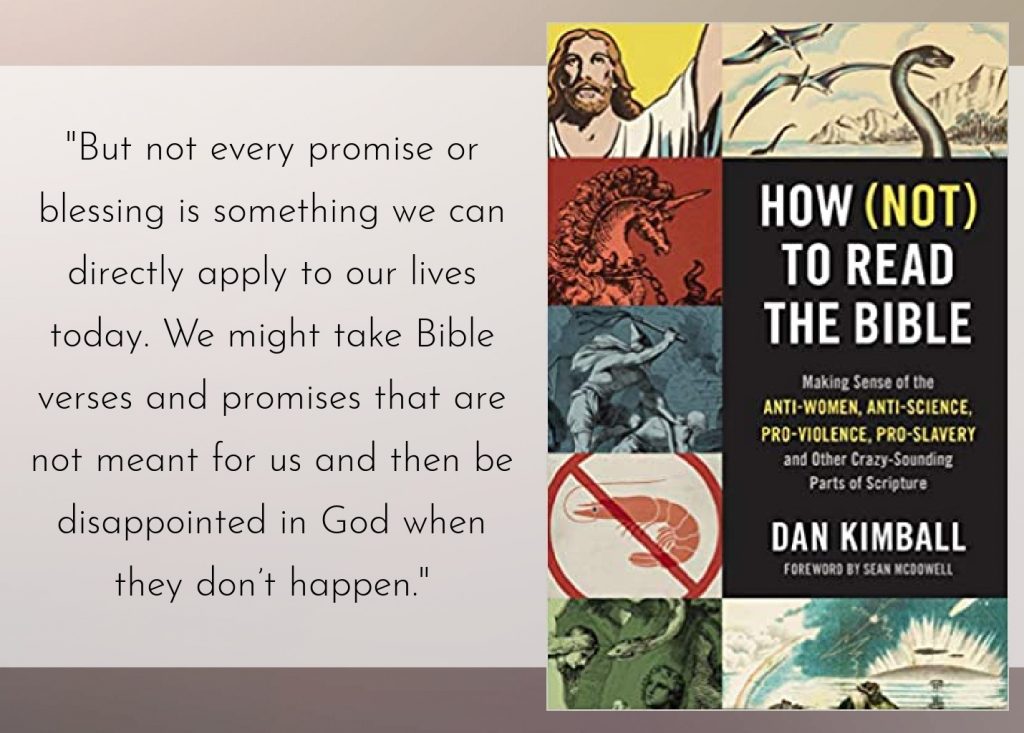
Steeped In Stories: Timeless Children’s Novels to Refresh Our Tired Souls, by Mitali Perkins: Classic movies, songs, shows, people and books—especially books—are being canceled left and right these days, with older works deemed outdated, irrelevant, or even toxic based on modern perspectives on what types of cultural representation, verbiage, and themes we consider acceptable. While many parents and educators are quick to remove older “misguided” books from circulation, and others argue for continuing to embrace the classics while disregarding their problematic content, children’s author Mitali Perkins proposes a third option: reading these classic books, embracing their powerful lessons and themes while acknowledging their insensitivity or misguidedness in certain areas and using these faux pas to introduce helpful discussions.
Mitli Perkins was raised on classic stories that helped her make sense of her personal identity and adopted culture as the daughter of Bengali parents living in the California suburbs. Perkins saw herself in some of these stories, and found herself (or anyone like her) noticeably absent in others, but each book offered lessons she would carry into adulthood that would inform her own writing and parenting. Decades later, Perkins’ eyes have been opened to the cultural insensitivity and flaws built into the bones of many of these books, and though such awareness has not tainted her love for classic literature, she’s thinking more critically about the classics these days. In Steeped in Stories, she helps us to do the same.
Combining her own narrative with critical commentary and a Christian world view, Perkins begins by addressing the “elephant in the room: (i.e. the presence of problematic content in each of the books she is about to explore). She shows why certain issues are, indeed, problematic for the ways they portray certain cultures or individuals in a dehumanizing manner, or show deference to white western culture and those with political or economic power. Perkins argues against removing these books from shelves or even editing them (pointing out that simply removing problematic content undermines other merits of the literature, and might not hold up to future evolutions of values/norms). Instead, she makes a case for continuing to embrace the classics (welcoming their invitations into uncomfortable but important conversations regarding these topics) and also incorporating them into a more complete cannon with books from a wider variety of cultural backgrounds—books that can serve as mirrors for the marginalized in ways the well-known classics cannot.
Following this introduction, Perkins dedicates one chapter each to seven beloved classics, identifying a specific virtue that can be found in each one. (Love in Anne of Green Gables, Faith in Heidi, Hope in Emily of Deep Valley, Courage in The Hobbit, Temperance in Little Women, Justice in A Little Princess, and Prudence in The Silver Chair.) I loved this approach, and though I haven’t read all seven of the books, I appreciated Perkins’ insights into each story and the value of each one, as well as her modern-day take on the flaws of each book and how we might discuss such flaws with young readers. While I felt Perkins was overly harsh in her treatment of some of the books (her views are exceptionally “woke”), I commend her for her respectful tone towards the authors and the grace she shows them in their shortcomings. Perkins recognizes that these authors were largely products of their own times, unable to see the bias and insensitivity baked into their own ideologies and perspectives, and she is able to forgive the authors if not fully condoning their views.
As I said, I do think Perkins goes a little too far in her critique of outdated world views and mores, but she explains her views well, and in many instances helped me understand why certain terminologies or descriptors might be perceived as insensitive or hurtful. Perkins is helping me think more critically about all of the content I consume, and about the things I say and write. I admire Perkins’ willingness to shift her personal views, going so far as to acknowledge the missteps in some of her own books, and acknowledging the presence of hypercorrection occurring in modern works that is just as harmful in reinforcing stereotypes and divisiveness. She clearly cares deeply about consuming, creating, and sharing literature that is authentic, wholesome, and affirming. I too am a huge advocate for beautiful literature that points readers (especially young readers) towards truth and virtue, so in this I believe I have found a kindred spirit in Perkins and am thankful for her work in this space.
My Rating: 4 Stars.
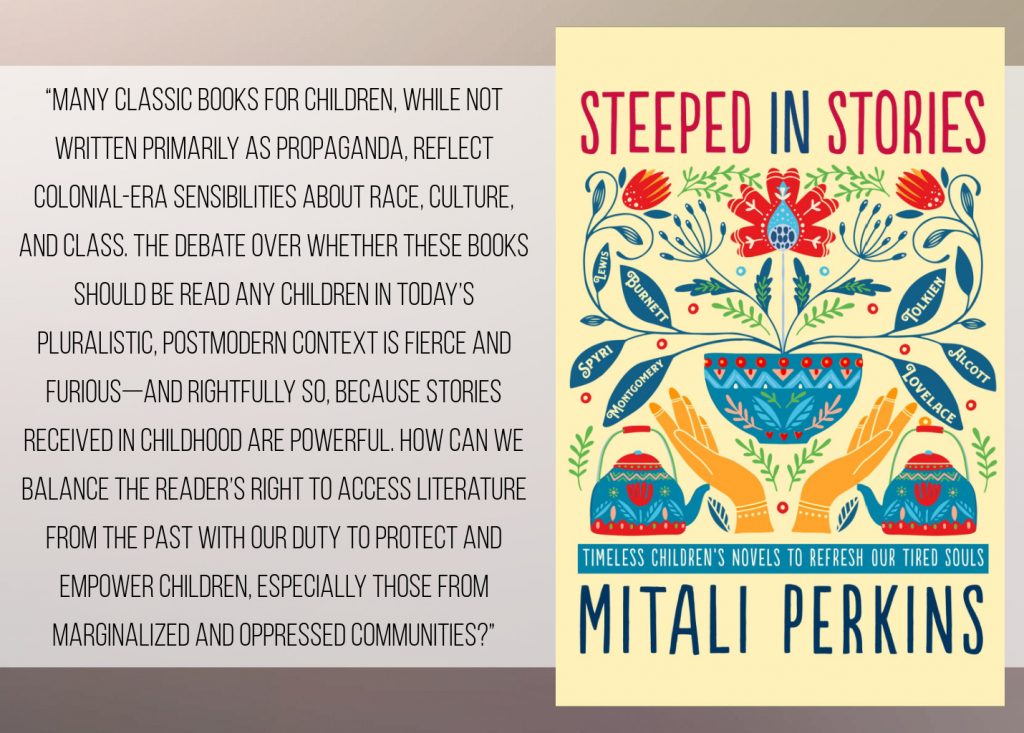
Forty Days on Being a One, by Juanita Campbell Rasmus: The Enneagram has taught us how each of us views the world and our experiences through a unique set of glasses, and this 9-book series of devotionals allows readers to slip on a new pair of glasses for forty days of inspiration, encouragement, and insight. Rather than taking the opportunity to spend forty days viewing life from an alternative pair of eyes, I chose to spend time with my own type in this book written by a fellow Type One.
As a One, pastor and spiritual director Juanita Campbell Rasmus has spent a lifetime wrestling with perfectionism, criticism (of herself and others), self-righteousness, and striving. As she has grown in spiritual and emotional health, she has uncovered gifts of grace, joy, gratitude, compassion, and freedom. Through stories from her life, accompanied by journaling prompts and suggested spiritual practices, Rasmus leads Ones in utilizing the Enneagram to find wholeness for ourself, and she offers anyone who loves or wants to understand the Ones in their life a window into the mindset and emotions of life from a One’s World.
While I don’t align with all of the theological points Rasmus makes here, I very much related to her personality, experiences, and struggles; not all Ones are alike so I was unsure if this would be the case, but I felt as though every lesson she has learned along her journey is one I too have learned or am in the process of learning. I think I might have liked this more if it were written by a group of One authors each providing a reflection or two, rather than forty devotionals written by the same author; still, this was a deeply relevant and helpful devotional for me.
My Rating: 4 Stars.
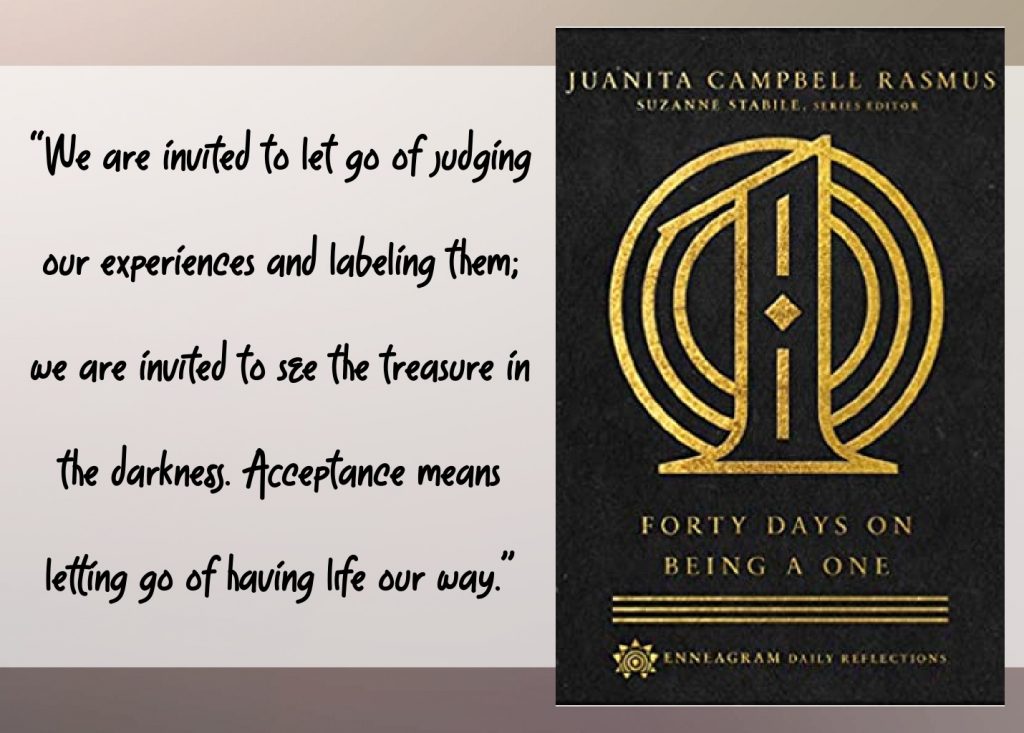
The Intentional Father: A Practical Guide to Raise Sons of Courage and Character, by Jon Tyson: As a prominent pastor and author, Jon Tyson has touched the lives of countless individuals, but the legacy he cares most about is that of his own son and daughter. Tyson takes his role as their father with great intentionality, and knowing that today’s young men are growing up with a severe lack of mentorship and masculine initiation/support/guidance, Tyson was particularly motivated to pour into the spiritual formation of his son. Inspired by the types of mentorship found in other religious traditions (and in past generations of Christians), Tyson and his son embarked on a strategic journey towards becoming a man of integrity, courage, and Godliness.
In this book, Tyson shares the step-by-step process he lived out with his son—a process involving special activities and rituals, rites of passage, pilgrimages, and daily time spent learning and growing together. Tyson relies on studies of Christian (and non-Christian) fathers to paint a powerful picture of why such intentionality is important, showing the value of such strategic mentorship and pointing to the consequences that generations of young men have suffered due to a defect of intentional fatherhood.
I’m not a father, but I do have sons and understand the importance of their having a father who invests in them in the ways Tyson describes. I will absolutely be passing this book on to Luke (actually, it was me who borrowed it from Luke, who bought it but hasn’t read it just yet), as he is the book’s intended audience, but as a woman and a mother, I found it helpful to read about this process in order to understand how best to support Luke as he walks this journey with our boys. Many of Tysons’ ideas will also apply to my mothering of our children, and the book has me thinking more thoughtfully about why and how we are developing children of good character and steadfast faith.
The book follows an easy-to-read format and makes this journey seem doable—not easy by any means, but worth the effort and possible for fathers willing to step up to the plate. Tyson provides plenty of guidance while also offering ideas that are entirely adaptable for different families. I love that this book exists and want to press it into the hands of every father I know.
My Rating: 4 Stars.
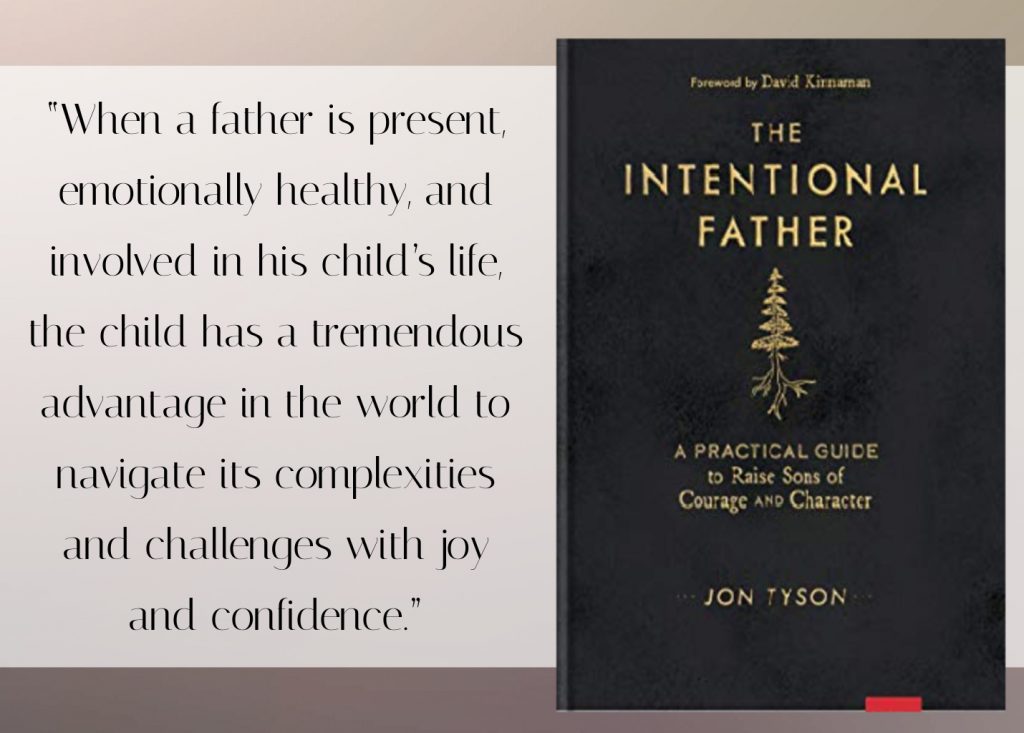
I’ll be back here next week with this month’s Fiction reviews. Until then, happy reading friends!